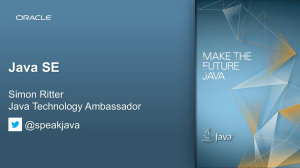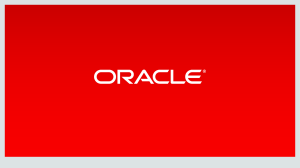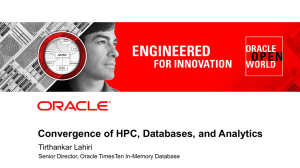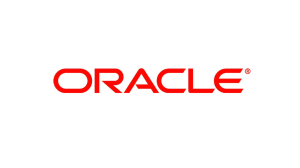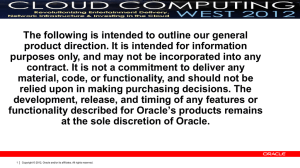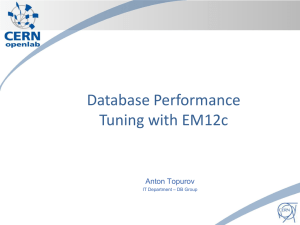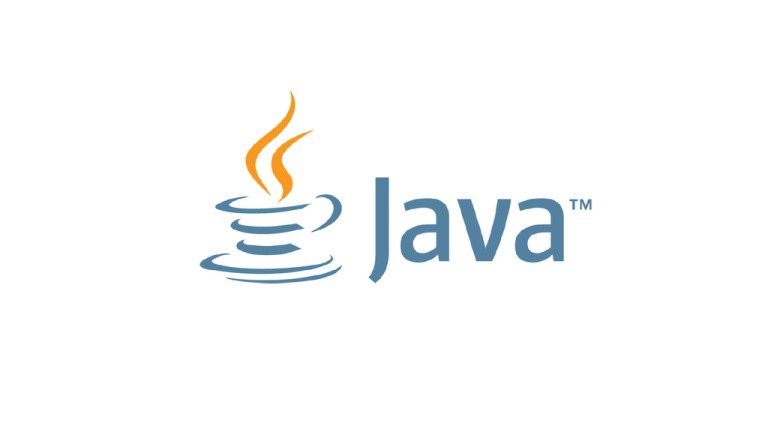
Main sponsor
Project Lambda: Functional
Programming Constructs &
Simpler Concurrency
In Java SE 8
Simon Ritter
Head of Java Evangelism
Oracle Corporation
Twitter: @speakjava
2
Copyright © 2012, Oracle and/or its affiliates. All rights reserved.
The following is intended to outline our general product
direction. It is intended for information purposes only, and may
not be incorporated into any contract. It is not a commitment to
deliver any material, code, or functionality, and should not be
relied upon in making purchasing decisions.
The development, release, and timing of any features or
functionality described for Oracle’s products remains at the sole
discretion of Oracle.
3
Copyright © 2012, Oracle and/or its affiliates. All rights reserved.
Base64
HTTP URL Permissions
Improve Contended Locking
DocTree API
Lambda (JSR 335)
Generalized Target-Type Inference
Limited doPrivileged
Compact Profiles
Remove the Permanent Generation
Date/Time API (JSR 310)
Repeating Annotations
Parameter Names
Nashorn
Type Annotations (JSR 308)
Lambda-Form Representation for Method Handles
Copyright © 2012, Oracle and/or its affiliates. All rights reserved.
Parallel Array Sorting
Configurable Secure-Random Number Generation
TLS Server Name Indication
4
Prepare for Modularization
Java 8
Bulk Data Operations
Unicode 6.2
Enhanced Verification Errors
Fence Intrinsics
Project Lambda:
Some Background
5
Copyright © 2012, Oracle and/or its affiliates. All rights reserved.
1930/40’s
6
Copyright © 2012, Oracle and/or its affiliates. All rights reserved.
1950/60’s
Images – wikipedia / bio pages
1970/80’s
Computing Today
Multicore is now the default
– Moore’s law means more cores, not faster clockspeed
We need to make writing parallel code easier
All components of the Java SE platform are adapting
– Language, libraries, VM
Herb Sutter
7
Copyright © 2012, Oracle and/or its affiliates. All rights reserved.
http://www.gotw.ca/publications/concurrency-ddj.htm
http://drdobbs.com/high-performance-computing/225402247
http://drdobbs.com/high-performance-computing/219200099
360 Cores
2.8 TB RAM
960 GB Flash
InfiniBand
…
Concurrency in Java
java.util.concurrent
(jsr166)
Phasers, etc
java.lang.Thread
(jsr166)
1.4
5.0
6
Project Lambda
Fork/Join Framework
(jsr166y)
7 8
2002 2003 2004 2005 2006 2007 2008 2009 2010 2011 2012
8
Copyright © 2012, Oracle and/or its affiliates. All rights reserved.
2013...
Goals For Better Parallelism In Java
Easy-to-use parallel libraries
– Libraries can hide a host of complex concerns
task scheduling, thread management, load balancing, etc
Reduce conceptual and syntactic gap between serial and parallel
expressions of the same computation
– Currently serial code and parallel code for a given computation are very different
Fork-join is a good start, but not enough
Sometimes we need language changes to support better libraries
– Lambda expressions
9
Copyright © 2012, Oracle and/or its affiliates. All rights reserved.
Bringing Lambdas To Java
10
Copyright © 2012, Oracle and/or its affiliates. All rights reserved.
The Problem: External Iteration
List<Student> students = ...
double highestScore = 0.0;
for (Student s : students) {
if (s.gradYear == 2011) {
if (s.score > highestScore) {
highestScore = s.score;
}
}
}
11
Copyright © 2012, Oracle and/or its affiliates. All rights reserved.
•
•
•
Client controls iteration
Inherently serial: iterate from
beginning to end
Not thread-safe because
business logic is stateful
(mutable accumulator
variable)
Internal Iteration With Inner Classes
More Functional, Fluent and Monad Like
Iteraction, filtering and
List<Student> students = ...
double highestScore =
students.filter(new Predicate<Student>() {
public boolean op(Student s) {
return s.getGradYear() == 2011;
}
}).map(new Mapper<Student,Double>() {
public Double extract(Student s) {
return s.getScore();
}
}).max();
12
Copyright © 2012, Oracle and/or its affiliates. All rights reserved.
accumulation are handled by the
library
Not inherently serial – traversal
may be done in parallel
Traversal may be done lazily – so
one pass, rather than three
Thread safe – client logic is
stateless
High barrier to use
– Syntactically ugly
Internal Iteration With Lambdas
SomeList<Student> students = ...
double highestScore =
students.stream()
.filter(Student s -> s.getGradYear() == 2011)
.map(Student s -> s.getScore())
.max();
• More readable
• More abstract
• Less error-prone
• No reliance on mutable state
• Easier to make parallel
13
Copyright © 2012, Oracle and/or its affiliates. All rights reserved.
Lambda Expressions
Some Details
Lambda expressions represent anonymous functions
– Like a method, has a typed argument list, a return type, a set of thrown
exceptions, and a body
– Not associated with a class
double highestScore =
students.stream()
.filter(Student s -> s.getGradYear() == 2011)
.map(Student s -> s.getScore())
.max();
14
Copyright © 2012, Oracle and/or its affiliates. All rights reserved.
Lambda Expression Types
•
Single-method interfaces used extensively to represent functions and
callbacks
– Definition: a functional interface is an interface with one method (SAM)
– Functional interfaces are identified structurally
– The type of a lambda expression will be a functional interface
This is very important
interface
interface
interface
interface
interface
15
Comparator<T>
FileFilter
Runnable
ActionListener
Callable<T>
Copyright © 2012, Oracle and/or its affiliates. All rights reserved.
{
{
{
{
{
boolean compare(T x, T y); }
boolean accept(File x); }
void run(); }
void actionPerformed(…); }
T call(); }
Target Typing
A lambda expression is a way to create an instance of a functional interface
– Which functional interface is inferred from the context
– Works both in assignment and method invocation contexts
Comparator<String> c = new Comparator<String>() {
public int compare(String x, String y) {
return x.length() - y.length();
}
};
Comparator<String> c = (String x, String y) -> x.length() - y.length();
16
Copyright © 2012, Oracle and/or its affiliates. All rights reserved.
Local Variable Capture
•
Lambda expressions can refer to effectively final local variables from
the enclosing scope
•
Effectively final means that the variable meets the requirements for final
variables (e.g., assigned once), even if not explicitly declared final
•
This is a form of type inference
void expire(File root, long before) {
...
root.listFiles(File p -> p.lastModified() <= before);
...
}
17
Copyright © 2012, Oracle and/or its affiliates. All rights reserved.
Lexical Scoping
•
The meaning of names are the same inside the lambda as outside
•
A ‘this’ reference – refers to the enclosing object, not the lambda itself
•
Think of ‘this’ as a final predefined local
•
Remember the type of a Lambda is a functional interface
class SessionManager {
long before = ...;
void expire(File root) {
...
// refers to ‘this.before’, just like outside the lambda
root.listFiles(File p -> checkExpiry(p.lastModified(), this.before));
}
boolean checkExpiry(long time, long expiry) { ... }
}
18
Copyright © 2012, Oracle and/or its affiliates. All rights reserved.
Type Inferrence
Compiler can often infer parameter types in lambda expression
Collections.sort(ls, (String x, String y) -> x.length() - y.length());
Collections.sort(ls, (x, y) -> x.length() - y.length());
Inferrence based on the target functional interface’s method signature
Fully statically typed (no dynamic typing sneaking in)
– More typing with less typing
19
Copyright © 2012, Oracle and/or its affiliates. All rights reserved.
Method References
•
Method references let us reuse a method as a lambda expression
FileFilter x = new FileFilter() {
public boolean accept(File f) {
return f.canRead();
}
};
FileFilter x = (File f) -> f.canRead();
FileFilter x = File::canRead;
20
Copyright © 2012, Oracle and/or its affiliates. All rights reserved.
Constructor References
interface Factory<T> {
T make();
}
Factory<List<String>> f = ArrayList<String>::new;
Equivalent to
Factory<List<String>> f = () -> return new ArrayList<String>();
When f.make() is invoked it will return a new ArrayList<String>
21
Copyright © 2012, Oracle and/or its affiliates. All rights reserved.
Library Evolution
22
Copyright © 2012, Oracle and/or its affiliates. All rights reserved.
Library Evolution
The Real Challenge
• Adding lambda expressions is a big language change
• If Java had them from day one, the APIs would definitely look different
Most important APIs (Collections) are based on interfaces
• How to extend an interface without breaking backwards compatability?
• Adding lambda expressions to Java, but not upgrading the APIs to use
them, would be silly
• Therefore we also need better mechanisms for library evolution
23
Copyright © 2012, Oracle and/or its affiliates. All rights reserved.
Library Evolution Goal
Requirement: aggregate operations on collections
– New methods required on Collections to facilitate this
– forEach, stream, parallelStream
int heaviestBlueBlock =
blocks.stream()
.filter(b -> b.getColor() == BLUE)
.map(Block::getWeight)
.reduce(0, Integer::max);
This is problematic
– Can’t add new methods to interfaces without modifying all implementations
– Can’t necessarily find or control all implementations
24
Copyright © 2012, Oracle and/or its affiliates. All rights reserved.
Solution: Virtual Extension Methods
AKA Defender Methods
• Specified in the interface
• From the caller’s perspective, just an ordinary interface method
• List class provides a default implementation
• Default is only used when implementation classes do not provide a body
for the extension method
• Implementation classes can provide a better version, or not
interface Collection<E> {
default Stream<E> stream() {
return StreamSupport.stream(spliterator());
}
}
25
Copyright © 2012, Oracle and/or its affiliates. All rights reserved.
Virtual Extension Methods
Stop right there!
• Err, isn’t this implementing multiple inheritance for Java?
• Yes, but Java already has multiple inheritance of types
• This adds multiple inheritance of behavior too
• But not state, which is where most of the trouble is
• Though can still be a source of complexity due to separate compilation and
dynamic linking
26
Copyright © 2012, Oracle and/or its affiliates. All rights reserved.
Functional Interface Definitions
Single Abstract Method (SAM) type
A functional interface is an interface that has one abstract method
– Represents a single function contract
– Doesn’t mean it only has one method
Abstract classes may be considered later
@FunctionalInterface annotation
– Helps ensure the functional interface contract is honoured
– Compiler error if not a SAM
27
Copyright © 2012, Oracle and/or its affiliates. All rights reserved.
The Stream Class
java.util.stream
Stream<T>
– A sequence of elements supporting sequential and parallel operations
– Evaluated in lazy form
– Collection.stream()
– Collection.parallelStream()
List<String> names = Arrays.asList(“Bob”, “Alice”, “Charlie”);
System.out.println(names.stream().
filter(e -> e.getLength() > 4).
findFirst().
get());
28
Copyright © 2012, Oracle and/or its affiliates. All rights reserved.
java.util.function Package
Predicate<T>
– Determine if the input of type T matches some criteria
Consumer<T>
– Accept a single input argumentof type T, and return no result
Function<T, R>
– Apply a function to the input type T, generating a result of type R
Plus several more
29
Copyright © 2012, Oracle and/or its affiliates. All rights reserved.
Lambda Expressions in Use
30
Copyright © 2012, Oracle and/or its affiliates. All rights reserved.
Simple Java Data Structure
public class Person {
public enum Gender { MALE, FEMALE };
String name;
Date birthday;
Gender gender;
String emailAddress;
public String getName() { ... }
public Gender getGender() { ... }
public String getEmailAddress() { ... }
public void printPerson() {
// ...
}
}
31
Copyright © 2012, Oracle and/or its affiliates. All rights reserved.
List<Person> membership;
Searching For Specific Characteristics (1)
Simplistic, Brittle Approach
public static void printPeopleOlderThan(List<Person> members, int age) {
for (Person p : members) {
if (p.getAge() > age)
p.printPerson();
}
}
public static void printPeopleYoungerThan(List<Person> members, int age) {
// ...
}
// And on, and on, and on...
32
Copyright © 2012, Oracle and/or its affiliates. All rights reserved.
Searching For Specific Characteristics (2)
Separate Search Criteria
/* Single abstract method type */
interface PeoplePredicate {
public boolean satisfiesCriteria(Person p);
}
public static void printPeople(List<Person> members, PeoplePredicate match) {
for (Person p : members) {
if (match.satisfiesCriteria(p))
p.printPerson();
}
}
33
Copyright © 2012, Oracle and/or its affiliates. All rights reserved.
Searching For Specific Characteristics (3)
Separate Search Criteria Using Anonymous Inner Class
printPeople(membership, new PeoplePredicate() {
public boolean satisfiesCriteria(Person p) {
if (p.gender == Person.Gender.MALE && p.getAge() >= 65)
return true;
return false;
}
});
34
Copyright © 2012, Oracle and/or its affiliates. All rights reserved.
Searching For Specific Characteristics (4)
Separate Search Criteria Using Lambda Expression
printPeople(membership,
p -> p.getGender() == Person.Gender.MALE && p.getAge() >= 65);
We now have parameterised behaviour, not just values
– This is really important
– This is why Lambda statements are such a big deal in Java
35
Copyright © 2012, Oracle and/or its affiliates. All rights reserved.
Make Things More Generic (1)
interface PeoplePredicate {
public boolean satisfiesCriteria(Person p);
}
/* From java.util.function class library */
interface Predicate<T> {
public boolean test(T t);
}
36
Copyright © 2012, Oracle and/or its affiliates. All rights reserved.
Make Things More Generic (2)
public static void printPeopleUsingPredicate(
List<Person> members, Predicate<Person> predicate) {
for (Person p : members) {
if (predicate.test())
p.printPerson();
}
Interface defines behaviour
}
Call to method executes behaviour
printPeopleUsingPredicate(membership,
p -> p.getGender() == Person.Gender.MALE && p.getAge() >= 65);
Behaviour passed as parameter
37
Copyright © 2012, Oracle and/or its affiliates. All rights reserved.
Using A Consumer (1)
java.util.function
interface Consumer<T> {
public void accept(T t);
}
public void processPeople(List<Person> members,
Predicate<Person> predicate,
Consumer<Person> consumer) {
for (Person p : members) {
if (predicate.test(p))
consumer.accept(p);
}
}
38
Copyright © 2012, Oracle and/or its affiliates. All rights reserved.
Using A Consumer (2)
processPeople(membership,
p -> p.getGender() == Person.Gender.MALE && p.getAge() >= 65,
p -> p.printPerson());
processPeople(membership,
p -> p.getGender() == Person.Gender.MALE && p.getAge() >= 65,
Person::printPerson);
39
Copyright © 2012, Oracle and/or its affiliates. All rights reserved.
Using A Return Value (1)
java.util.function
interface Function<T, R> {
public R apply(T t);
}
public static void processPeopleWithFunction(
List<Person> members,
Predicate<Person> predicate,
Function<Person, String> function,
Consumer<String> consumer) {
for (Person p : members) {
if (predicate.test(p)) {
String data = function.apply(p);
consumer.accept(data);
}
}
}
40
Copyright © 2012, Oracle and/or its affiliates. All rights reserved.
Using A Return Value (2)
processPeopleWithFunction(
membership,
p -> p.getGender() == Person.Gender.MALE && p.getAge() >= 65,
p -> p.getEmailAddress(),
email -> System.out.println(email));
processPeopleWithFunction(
membership,
p -> p.getGender() == Person.Gender.MALE && p.getAge() >= 65,
Person::getEmailAddress,
System.out::println);
41
Copyright © 2012, Oracle and/or its affiliates. All rights reserved.
Conclusions
Java needs lambda statements for multiple reasons
– Significant improvements in existing libraries are required
– Replacing all the libraries is a non-starter
– Compatibly evolving interface-based APIs has historically been a problem
Require a mechanism for interface evolution
– Solution: virtual extension methods
– Which is both a language and a VM feature
– And which is pretty useful for other things too
Java SE 8 evolves the language, libraries, and VM together
42
Copyright © 2012, Oracle and/or its affiliates. All rights reserved.
43
Copyright © 2012, Oracle and/or its affiliates. All rights reserved.

